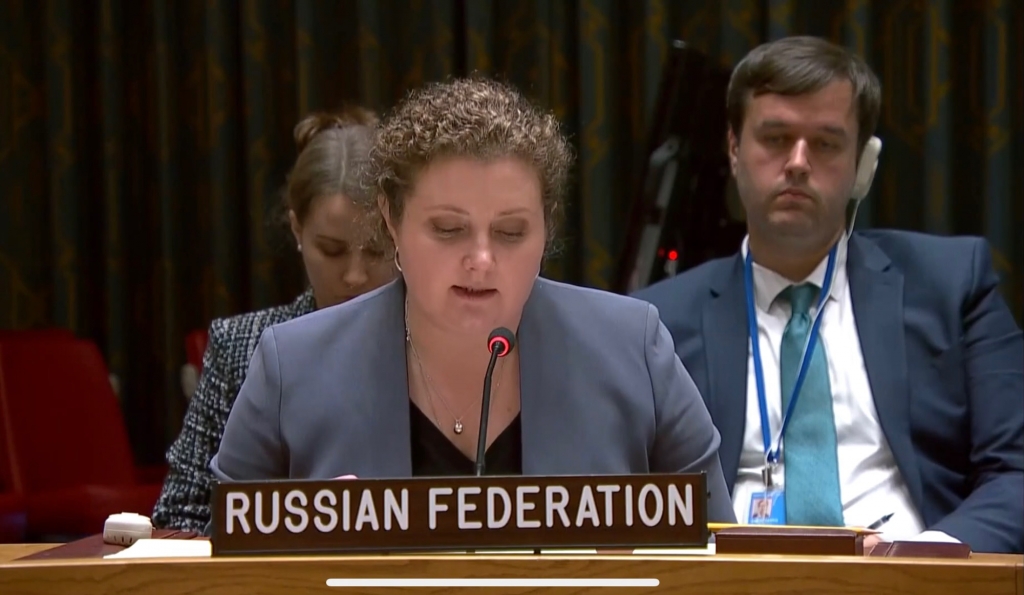Statement by Deputy Permanent Representative Anna Evstigneeva at UNSC briefing on the DPRK
Mme.President,
We listened attentively to USG DiCarlo and find it surprising that neither her remarks nor the statement by the Secretary-General following the launch said a single word about the growing military activity of the United States, the Republic of Korea, and Japan in North-East Asia which has a destructive impact on the situation in the region. This is an obvious thing. Yet the Secretariat, which is supposed to be impartial and objective, prefers to ignore this crucial circumstance. At the same time, the briefing did mention some unrelated topics, like the doubtful allegations about Pyongyang’s engagement in malicious cyberactivity.
Russia consistently advocates for a comprehensive approach by the Security Council to the situation on the Korean Peninsula, and a well-balanced consideration of all factors that may have an influence on it. Today we once again see the counter-productive attempts to draw a distorted image of the current developments. It runs counter to our task as members of the Security Council to react objectively and without bias to threats to international peace and security and takes us farther from settling the entire set of the problems of the Korean Peninsula.
Recently, the situation in the sub-region has escalated significantly. We repeatedly pointed at the root cause of this tension. It is the ambition of the United States and its allies to build up pressure on the DPRK as part of their “extended deterrence” concept. The negative impact of unstopping military exercises in the sub-region must be evident to all, yet Washington is not even going to slow down its pace.
On 25 May the US and South Korea held shooting exercises in the vicinity of the DPRK border. As reported by the media, 2,500 troops and approximately 610 weapons systems took part in the drill including fighter jets, combat helicopters, UAVs, tanks and artillery. The maneuvers were but the first part of the “combined annihilation firepower drills” which is scheduled to last until mid-June. Just like the US-South Korean drills in spring 2023, this exercise also was the largest-scale in the recent years. Whatever the reasons may be, it is clear that such steps do not help to de-escalate, and as we point out time and again, the situation remains locked in a vicious circle.
These actions de-stabilize the situation in North-East Asia, but also in Asia Pacific at large. The region continues to be militarized, there are attempts to draw new dividing lines, which affect the global stability. This trend is confirmed by the recent US-South Korean agreements on nuclear weapons use, which will do nothing but fuel tensions and provoke an arms race.
Russia consistently opposes any military activity that may jeopardize security of the Korean Peninsula and North-East Asian states. By the same token, we are against the inhumane policy of enhancing the sanctions pressure. On a separate note, unilateral restrictions not only violate the sovereignty and legitimate interests of member states and contradict the norms and rules of international trade, but also undermine the integrity of UNSC-agreed restrictions.
We underscore once again that UN Security Council resolutions on the DPRK call for a political and diplomatic solution to the situation on the Korean Peninsula. There is no acceptable alternative to it, as we can see. In this connection, we again draw attention to the Russian-Chinese plan of action for a comprehensive settlement of the situation on the Korean Peninsula, which implies concrete steps by states at certain tracks. Obviously, this will require mutually respectful dialogue, that should account for legitimate concerns and rights of all the states involved, including the DPRK.
Representative of the United States said they were ready for dialogue. However we are not quite sure that Washington is truly prepared to hold meaningful discussions with Pyongyang. This is what the history of American foreign policy on the Korean Peninsula in the past ten years and today’s practical streps by the US are telling us.
We call on Washington to take concrete steps to reduce tensions and resume dialogue instead of shifting responsibility to other countries.
We remain convinced that the UN Security Council can also play a positive role if it deliberates in a constructive and comprehensive manner and proposes products that are aimed at attaining truly positive results. We stress that the relevant draft resolution by Russia and China on political and humanitarian aspects remains on the table.
Thank you.
